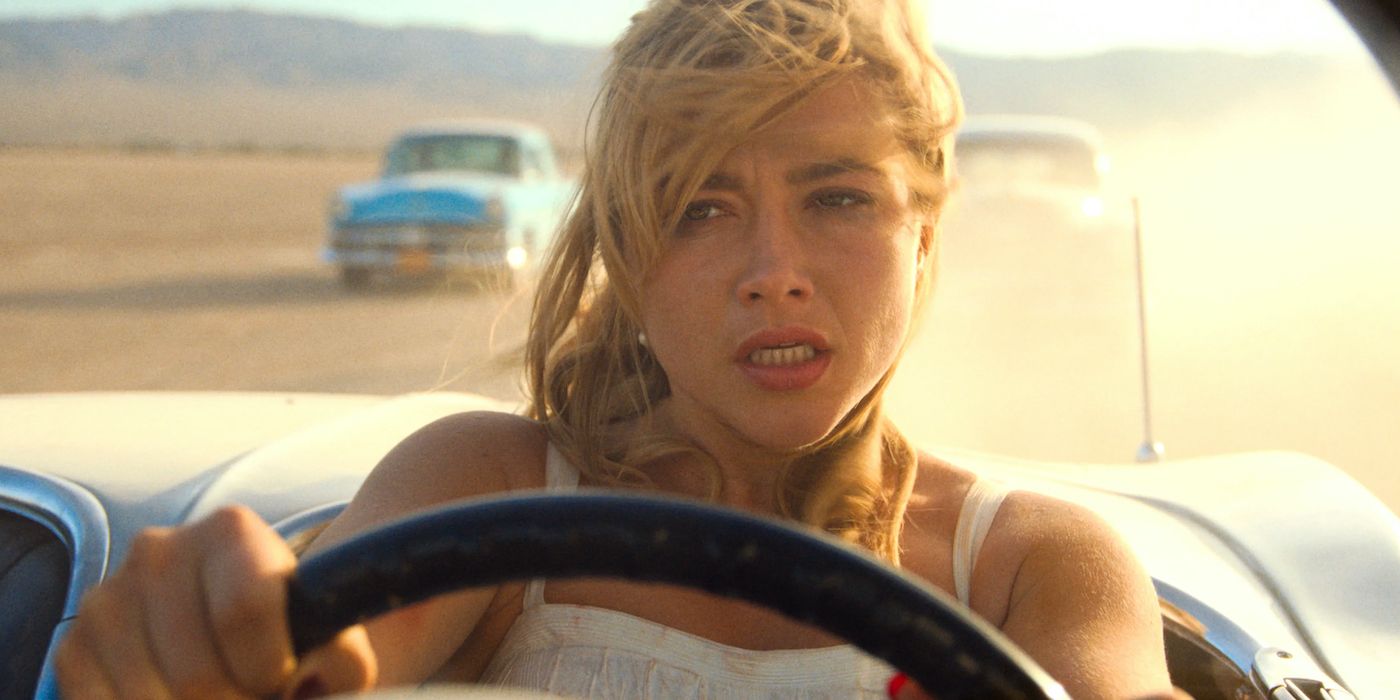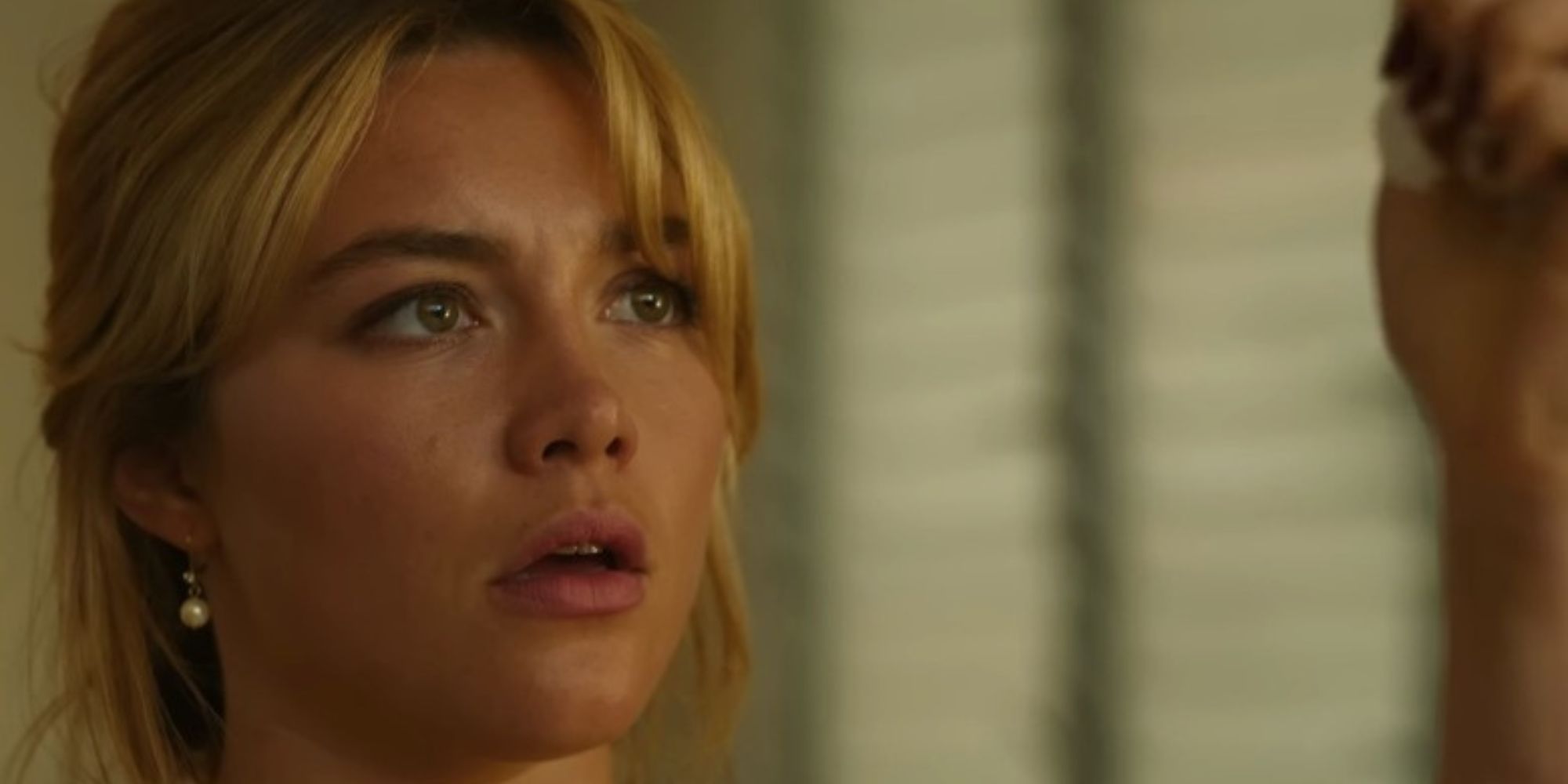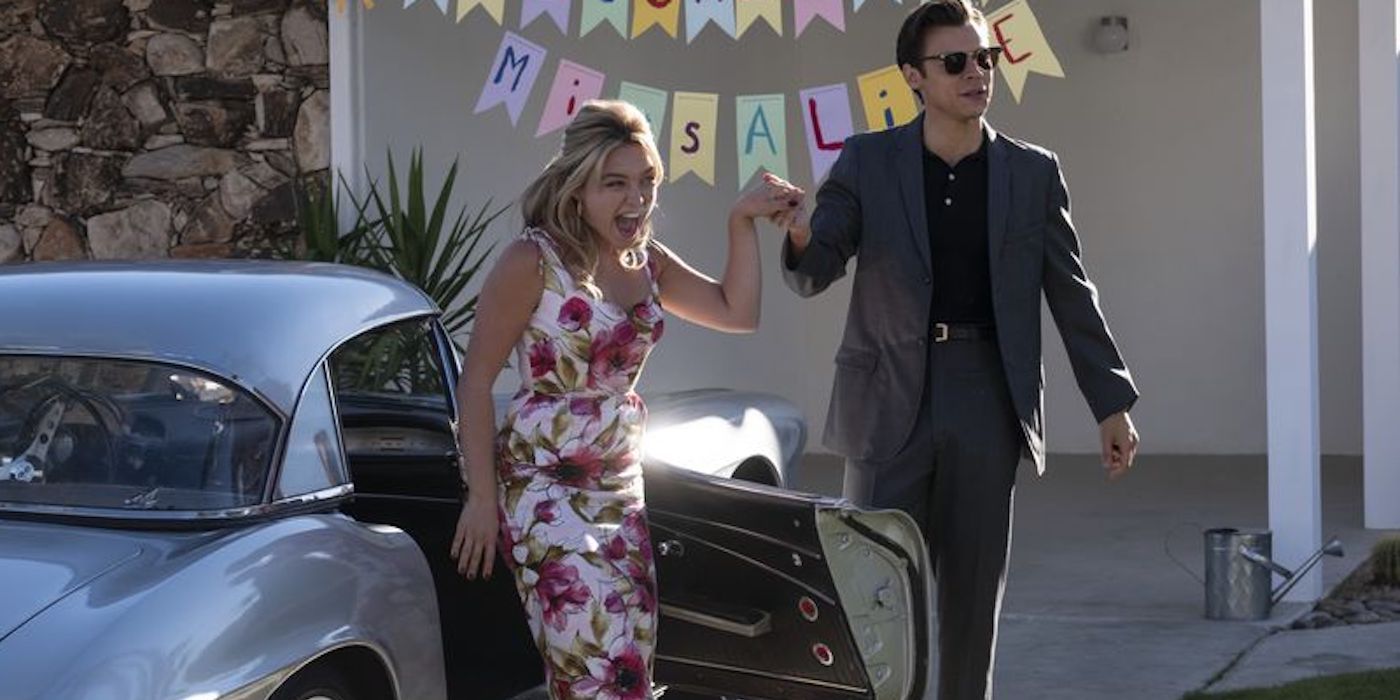The Big Picture
- Don't Worry Darling concludes with an assumed ending, leaving the audience to interpret what happens next, similar to films like Inception and Prisoners.
- However, the film fails to provide enough information and resolution, leaving many loose ends and plot holes unanswered.
- The lack of closure in both the real world and Victory creates a feeling of confusion and an incomplete ending, leaving the audience wanting more. Alice's journey to freedom feels far from over.
For a period of time in 2022, it felt like the world revolved around Don't Worry Darling. Olivia Wilde’s second film was all anyone could talk about, from on-set feuds to love affairs to actual spitting. Despite mediocre reviews, it performed fairly well at the box office, earning a worldwide gross of $87 million. Now that the controversial film is available to stream on both Hulu and Max, it's as good a time as any to revisit it, warts and all.

Don't Worry Darling
While her husband leaves home everyday to work in a top secret facility, a young 1950s housewife begins to question her life when she notices strange behavior from the other wives in the neighborhood.
- Release Date
- September 23, 2022
- Director
- Olivia Wilde
- Cast
- Florence Pugh , Olivia Wilde , Chris Pine , Gemma Chan , Nick Kroll , Harry Styles
- Runtime
- 123 minutes
- Studio
- New Line Cinema
What Is 'Don't Worry Darling' About?
Set in the idyllic 1950s, Don’t Worry Darling centers around Victory residents Alice (Florence Pugh) and Jack (Harry Styles) as they live their perfect lives. Jack leaves for work every day along with the other men of Victory, leaving their wives to stay at home where they clean, cook, and gossip with neighbors. At night, the men return home to a perfectly cooked, several-course dinner and a doting wife as the cycle resets to begin again the next day. But when Alice starts to notice things out of the ordinary — things she wasn’t supposed to see — she begins to question her reality and the suave, mysterious leader of the Victory Project, Frank (Chris Pine).
Just as Alice investigates the plausibility of her perfect life, the plausibility of the film’s big twist is also up for question. As Alice discovers, the Victory project is all one big simulation, a falsity. Men take their wives, most of them against their will, and place them in virtual reality, and when they leave for work in Victory, they actually exit the simulation to work in the real world. Men are also responsible for the physical upkeep of their spouses in real life, who remain catatonic as they never leave the simulation. Whether you caught Don't Worry Darling in theaters and are now giving it a second chance at home, or this is your first time watching, you'll notice that the film's ending doesn't live up to the significant build-up preceding it.
What Is the Big Twist of 'Don't Worry Darling'?
In a series of short flashbacks, it is revealed that the real Alice, living in the real world, works long shifts as a surgeon and just wants to rest after her stressful day, something that upsets her incel boyfriend, Jack. Jack is much less than the man we know him as in Victory. He is seemingly jobless, chronically online, and judging by Styles’ jarring makeover complete with long, ratty hair, he doesn’t make it outside very often. When Alice arrives home after a stressful day, Jack not only expects her to cook the dinner, but he also wants to have sex at the snap of his finger — both of which she rejects. His obsession with a podcast run by Frank (in the real world) combined with his frustrations with Alice (clearly the breadwinner of the relationship), leads him to enlist in Frank’s cultish Victory Project and imprison Alice in a world where she is the perfect wife.
Having discovered the ruse, Alice confronts Jack at their Victory home, which results in a struggle between the two, culminating in Alice smashing a whiskey glass over Jack's head, killing him. Similar to many other simulation-based films, if you die there, you die for real. So Alice bolts, heading straight for Victory headquarters in hopes of freedom. With the entirety of the Victory security team after her, Alice is able to narrowly squeeze through the gate that leads to her escape from the simulation. And just as the title flashes on the screen, we hear (but don’t see) Alice gasping for air as she wakes up from the perfect nightmare. We then see a blurred vision of her dancing — strongly suggesting that Alice has made her way back to a safe and free life. However, the film doesn't bother to show exactly how Alice made it to safety, leaving many a plot hole in its wake.
'Don't Worry Darling's Assumed Ending Doesn't Work
That’s it, that’s the end. It’s an assumed ending, meaning we as the audience are supposed to interpret or infer what happens next. Given the proper buildup and storytelling, assumed endings can be the perfect way to end a film. Assumed endings are different from a cliffhanger in the sense that they don’t promise a follow-up or continuation of the story — and they’re better off for it. These endings leave audiences with a rush of adrenaline and while they paint a pretty definitive end, there is no way to confirm the fate of the characters.
Movies like Inception and Prisoners (spoilers for these films ahead… watch them if you haven’t!) have assumed endings. Does the top keep spinning, or will it fall and prove Cobb (Leonardo DiCaprio) is awake and truly reunited with his children? The screen cuts to black before we get our answer — but it allows us to assume and theorize for ourselves. We know the stakes of Inception and the outcomes of both realities for Cobb as the movie spends its time establishing them. There isn’t anything up for question except for the question — does the top fall?
In Prisoners, the climax has come and gone. Detective Loki (Jake Gyllenhaal) finds the kidnapper and prevents the murder of Keller’s (Hugh Jackman) kid, rushing her to the hospital safely, albeit in the most heart-pounding, intense scene ever. Both children are safe and healthy, same for Detective Loki. Only one piece remains — the fate of Keller. The dramatic irony is present as we know where Keller is, left for dead in an underground ditch, but Detective Loki is unaware until he hears a whistle (brilliant use of Chekhov’s Gun gun, but that’s an entirely different conversation). Faint at first, he dismisses it. Upon hearing the whistle again, he is more tuned in. We see the look of recognition on Detective Loki’s face as the film cuts to black. Every loose end is tied up except for Keller’s fate, but we can assume, knowing Detective Loki’s character, that he will find him. While it seems like a guarantee, we will never know for sure.
'Don't Worry Darling' Leaves Us With More Questions Than Answers
As an audience, we are satisfied with these endings. They leave us wanting more but convey through their endings that we don’t need any continuation of the story. Don’t Worry Darling just leaves the audience wanting more. The film follows the assumed ending outline and has a potentially great conclusion but fails to provide enough information to leave the audience satisfied with where the story stops. This is primarily due to the fact that it doesn’t resolve its problems. Unlike the films mentioned above, which have closed out the entirety of their story (with the exception of their assumed ending), Don’t Worry Darling bites off more than it can chew, creating so many questions (Alice's fate in the real world, the fate of Victory, how Frank’s death impacts the project in the real world, etc.) that it has no intention of returning to address or provide closure to. As a result, the latter half of the film feels incomplete due to the gaping plot holes and loose ends that it neglects to tie up.
And even if all the plot holes are answered in both realities, the largest issue remains – what’s next for Alice? We spend so little time in the real world that next to nothing is established. We know Jack enrolled in the Victory program and agreed to take care of Alice in her comatose state, but nothing else is explained. How did Jack get her out of work, essentially kidnapping her without any repercussions? How much of a pull did Frank have in the real world, and how did he run the Victory Project without raising any red flags? Is the government complicit or clueless? We know Alice is going to wake up in the real world, lying next to her dead boyfriend, and the complications of that more than explain themselves. She probably won’t know where she is, or how much time she has lost, so what are her next steps? If Frank has a security team in Victory, odds are they exist in reality too, so are they willing to kill to cover up Alice’s discovery? The film is so concentrated on Alice’s escape from Victory that it fails to establish a background for its plot twist. Making it back to reality is just the next step, but it’s far from a conclusion. Alice isn’t truly safe from Victory until she has sorted out her new mess in reality.
'Dont Worry Darling' Has Too Many Plot Holes and Loose Ends
Just a couple more minutes, dispersed throughout the film to tie up loose ends, would alleviate these issues and leave Don’t Worry Darling successful in its ending. As an example, perhaps the government (assuming they are uninvolved with Frank’s exploits, to begin with) discovers how the Victory Project is being conducted in the real world and this revelation starts an investigation within the FBI. Their search could be intercut with Alice’s, leading up to them rushing to Jack’s apartment (or wherever the simulation is run) as Alice wakes up. The ending can remain the same, but the audience would be able to assume the best outcome for Alice, gasping for air as we know she is in safe hands. Potential endings aside, Don’t Worry Darling ultimately needed to split its focus on the external happenings in reality and Alice’s escape out of Victory. Once the twist is revealed to the audience and we are now in on the ruse, the real world is of equal importance as Victory, and if both realities had been utilized, it would have made a huge difference in the messy pacing of the final act.
As it stands, Don’t Worry Darling ends prematurely, right at the height of its climax. It has the right idea, attempting to end on a note that elicits feelings of excitement, hope, maybe even dread, but fails due to its lack of closure. The sense of fulfillment the film was aiming for is instead met by confusion. The burning questions surrounding both the real world and Victory remain unanswered and lead to an empty, incomplete feeling as the credits roll. Alice may have escaped Victory, but her journey to freedom, much like the plot of the film, feels far from over.
Don't Worry Darling is available to stream on Hulu and Max in the U.S.




